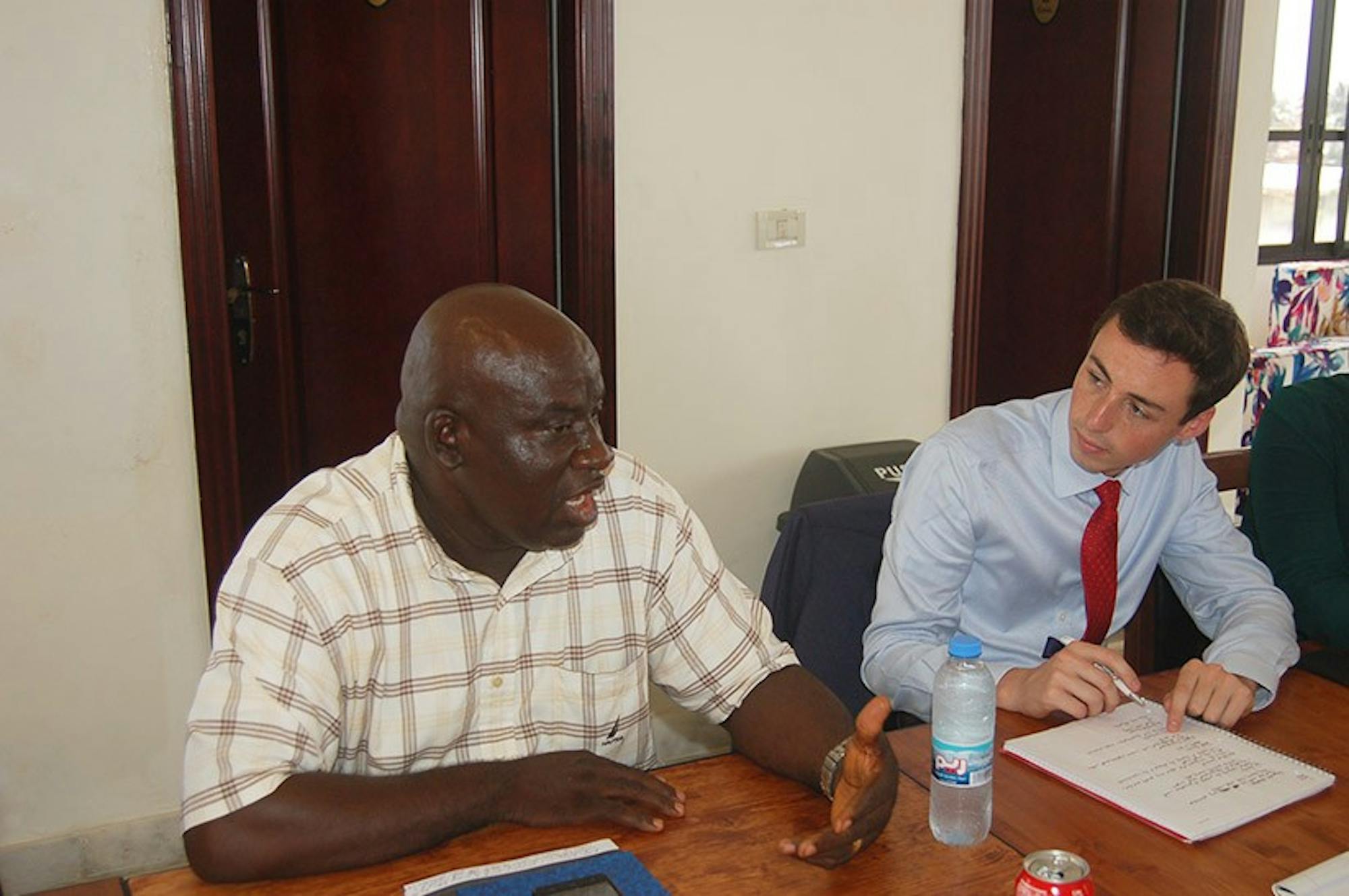Over winter interim, 12 Dartmouth students traveled to Monrovia, Liberia, where they witnessed a historic Supreme Court ruling that preceded a runoff presidential election, marking Liberia’s first democratic, peaceful handover of power since 1944.
“The election was actually supposed to be finished by the time we got to Liberia, but it was contested, so it ended up going through the Supreme Court. This is the first time this has happened in Liberian history,” Hannah Pruitt ’19 said. “We got to sit in on that Supreme Court hearing, and it was very cool to see real democracy taking place in Liberia and the Liberian people engaging with democracy for the first time.”
The runoff election advanced between celebrity soccer player George Weah of the Coalition for Democratic Change Party and then-Vice President Joseph Boakai of the Unity Party. On Dec. 26, Weah won 61.5 percent of the votes and succeeded Ellen Johnson Sirleaf as president of Liberia.
Dartmouth students traveled to Monrovia as part of the off-campus, experiential learning portion of Public Policy 85, “Global Policy Leadership.” The course began in the fall, and economics professor and creator of the course Charles Wheelan ’88 said students prepared in the classroom by intensively reading up on and discussing Liberia’s history.
The course’s culminating project then calls on the students to collaborate and create a list of policy recommendations to improve the state of Liberia.
“The goal in this class was to study economic development in a post-conflict state and come up with a list of policy recommendations for the next Liberian administration that would hypothetically put them on a path to economic development,” Pruitt said. “The unique aspect is doing this in a resource-constrained country and thinking about how to allocate these limited resources most effectively.”
Wheelan developed this course in 2012 with support from the Rockefeller Center for Public Policy. Each year, the template for the course remains the same, but the location for the off-campus experience differs. Some of the course’s previous destinations and their goals include India, to create a memo for the next government during the eve of the nation’s elections, or the Middle East, to discuss recommendations for U.S. involvement in the peace process, Wheelan said.
Despite previous travel experiences, Wheelan believes that Liberia provided an especially unique experience.
“The country was decimated by a decade and a half of civil war,” Wheelan said. “There is no infrastructure to speak of. Even in a place like India, which has a reputation for poverty, compared to Liberia, India seems like Switzerland. Having said that, there was a lot of optimism. Liberia has turned a corner — this election was really a big deal — and that was quite heartening.”
To help aid Liberia’s development, Pruitt said that the students’ top policies focused on increasing infrastructure, such as getting the electricity grid running, and developing working road networks. Additionally, students focused on increasing human capacity and creating educational and vocational training.
Connie Lee ’18 said that she developed a policy involving the integration of collective collateral in financing agricultural production.
“One big problem right now is that it’s very hard to start businesses or to produce agriculture very successfully because people can’t get loans from banks to get equipment or financing they might need, so my suggestion was to allow communities to provide collateral together,” Lee said. “If somebody doesn’t pay back their loans, the whole community makes them accountable, rather than that person just defaulting on the loan.”
Lee believes this system can be incorporated into the community-based social structure of Liberia, while also providing more financing and bolstering business.
Throughout the trip, students met with influential figures who could give different impressions of what the government must accomplish to set the country on a positive development path, Wheelan said.
Students met with people such as the Liberian Minister of Education and Commissioner General of the Revenue Authority as well as members from the National Public Health Institute of Liberia and various non-governmental organizations, according to Pruitt and Lee.
Lee’s favorite person she met with during the trip was one of the deputy director generals of the NPHIL, Mosoka Fallah, who was recognized as one of the TIME People of the Year in 2014 for his response to the Ebola epidemic.
“Dr. Fallah is a very well-educated doctor and coordinated the system that incorporated a lot of western aid,” Lee said. “He responded to Ebola by setting up these isolation facilities and coming up with a nation-wide education and response system to keep Ebola from spreading. The combination of getting to meet someone who was so accomplished and had so much of an impact on a country made our meeting with him particularly enjoyable.”
After extensive meetings and collaboration, the students drafted a roughly 70-page memo for the next Liberian government. Lee, Pruitt and Wheelan agree that the course allows students the unique opportunity to take a hands-on approach to public policy.
“The reason this program is so valuable is that you can study developmental economics and you can look at the models, but when you actually find yourself on the ground in a place like Liberia, it brings some of those things to life,” Wheelan said. “It really does bring the challenges into stark contrast in a way that is quite constructive.”
Maria is a freshman from Oak Brook, IL. Maria plans to major in Cognitive Science and minor in Computer Science, and she joined The D because she wants to bring attention to current events on campus. In her free time, she enjoys golfing, learning about new cultures, and playing with her two puppies.




